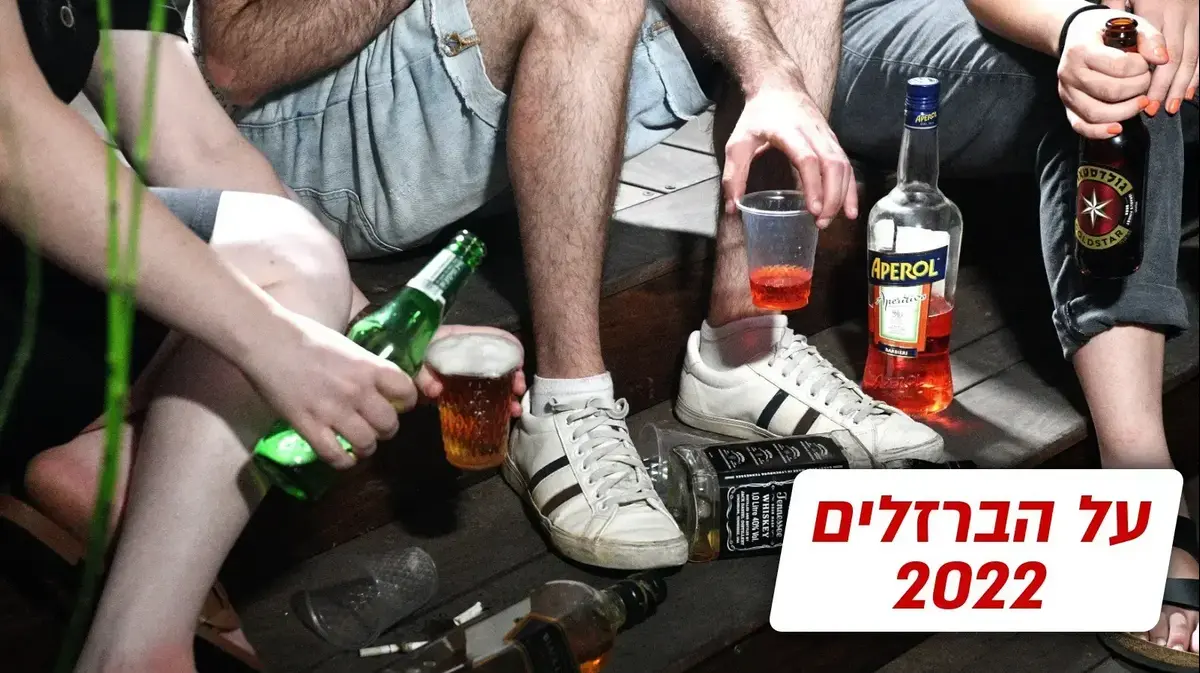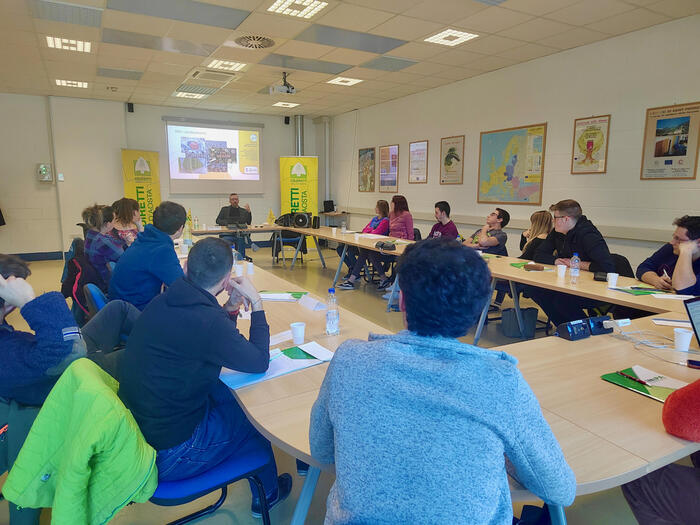They used to be a rare sight.
Today, even 10-year-olds are "youth at risk"
The consequences of the corona virus are still clearly visible, and in the 80 "Elam" centers across the country, it is no longer surprising to see even 10-year-old children. The number of cases of violence in the home and the scope of suicide have soared, and the children are looking for a listening ear and a warm shoulder.
"There was someone who would listen" |
"On the irons 2022", a special project
Uri Sela
08/16/2022
Tuesday, August 16, 2022, 2:17 p.m. Updated: 2:18 p.m.
Share on Facebook
Share on WhatsApp
Share on Twitter
Share by email
Share in general
Comments
Comments
"It's like Friday dinner with the whole family, only on Thursday, with less food, and with more broken people"
The soccer field fills up with boys as the evening progresses.
The average is high school age, a large standard deviation - in one corner 12-year-olds are making noise on scooters, in the other is a group of 20-year-olds and older who are sharing experiences from the army.
In the space operated by the "Elam" association, the gap is blurred.
Dozens of children pass through the compound in the city in the center of the country every day.
About 80 others operate like him, from Ofakim to Safed.
The association's volunteers who are on site are selected after a strict screening process that includes a series of interviews.
For a few hours, they provide the children with a listening ear, accompaniment and guidance, rare necessities in some houses in the neighborhood.
During the holidays, given the dangers associated with inactivity, the place becomes critical.
"The ripples of the corona are still there, mental distress, sexual abuse, drug and alcohol use," says Oren Benisho, director of the association's street work headquarters.
Benisho identifies an increase both in the intensity of the phenomena, and in their scope, in what he calls the "expansion of the margins".
Before the epidemic, he says, young children were a rare sight in the compound.
Today he is not surprised when ten year olds arrive.
"The children stayed at home for a long time and the parents went to work. They felt the need to go out," he explains.
And when they left the houses, they recognized the field as a social meeting place that leaves the door open for them.
In front of the alternative of public gardens and inspectors, the folding tables with the tea, hot dish and snacks and the scattered crown chairs suddenly looked inviting.
"We, the friends, have an unwritten rule that comes here every week," says one of the 15-year-old girls, laughing: "It's like a Friday dinner with the whole family, only on Thursday, with less food, and with more broken people."
"The children stayed at home for a long time and the parents went to work. They felt the need to go out" (Photo: Reuven Castro)
The common assumption is that teenagers in adolescence dislike "parental" figures and seek the company of their peers.
However, more than the connection with the friends, the children say that the attraction of the field is precisely the adults, the association's volunteers who pass between them, each time sitting with one of the groups or taking one aside for a personal conversation.
When they are asked what they found here and not in any other sitting place, the repeated mantra is "there was someone here who would listen".
One of three girls aged 15, 16 and 17 who sit with a 43-year-old volunteer says that he helped her overcome social ostracism.
"I had a place to share here."
For some it doesn't end at school.
"I still come here regularly and consult with people who are only two years older than me," shares D., 27 years old, known as "the father of the place".
"People from the outside don't understand this. You have no place of refuge in such neighborhoods. The trouble is at home and not outside."
In the center of the extension, a freestyle circuit runs non-stop.
"We can mediate the situation for them, calm them down" (Photo: Reuven Castro)
The spaces operate mainly in neighborhoods with a high concentration of "youth in risk situations", as the association defines it.
The tension is not visible at first glance.
To notice the complexity you need to know the area, or at least dig deep into the conversation.
So, the stories come up about the girl's father who was murdered, or about the boy who beats him at home.
As a police car passes on the street, one of the volunteers stops and asks to draw my attention.
"Look at how they walk," he points out.
The children follow her with a look until she passes.
"It's good that we are here when she arrives. We can mediate the situation for them, calm them down."
The tensions are sometimes also directed inward, towards the team.
"A few years ago, there was a boy who attacked me, and we closed the space. A week after that, I came to him and talked to him. He didn't understand why, he asked, "Aren't you angry with me?" I said, "I'm angry, and it hurts, but I'm here for you," says the volunteer.
In the last case, about a month ago, one of the groups argued with the volunteers, went to the side, placed chairs and opened a 'competing space', with Bamba.
"We are not in your space," they declared.
The next time they came, they forgot about it.
From the last report of "Elam" (2021)
2,126 teenagers reported violence outside the home, 1.7 times compared to 2020 and 3.6 times compared to 2019, a year before the corona
1,893 suffered from violence at home, 1.2 times compared to 2020 and 2.5 times compared to 2019.
1,177 were victims of online violence, 2.3 times more than in 2019.
1,682 reported that they suffered from sexual violence, 2.3 times compared to 2019.
5,097 used alcohol, 1.3 times more than in 2019.
4,256 used drugs, 1.5 times compared to 2019.
2,060 participated in unsupervised parties, 1.4 times compared to 2020 and 3.3 times compared to 2019.
4,000 reported that they suffered from depression and anxiety, 1.9 times more than in 2019.
1,432 tried to harm themselves, 1.2 times compared to 2020 and 1.5 times compared to 2019.
According to Prof. Carmit Katz, director of research at the Harov Institute and faculty member at the School of Social Work at Tel Aviv University, spaces like the one in Elam are only part of the solution.
"They do an excellent job, but the spaces provide a solution for youth who are already marginalized and ready to be helped. The problem is that for every such child there are at least four who do not seek help and we do not reach them. In my view, all youth are at risk," she explains.
"The solution that is missing is a prevention effort by an organization that is not branded for at-risk youth. Mia Dagan from TikTok, for example, uploaded an excellent video about dangerous spaces," says Katz.
"We don't have campaigns about children's rights, who they can turn to when they are in need, and how to deal with a friend who tells them about a problem. They don't know that they have the right to a life without physical and sexual violence. We adults know that, but we forgot to tell the children. As long as there is no An appeal to all the youth in Israel, we are not doing the minimum to protect them."
@mayadagan
The following organizations are opening anonymous help lines for times of need:*• Aid center for victims of sexual assault:* 1202 - female telephone answering service, 1203 - male telephone answering service, 'Kolmila' on Google - answering in one-on-one chat.
*• AL - The Child Protection Association:* *6935 - Telephone Answering, 054-2949596 - Text Message Correspondence. *• ARAN - Mental First Aid:* 1201 - Telephone Answering, 076-88444-00 - Text Message Correspondence .
Answering in a one-on-one chat on the website.
*• The attention line of the Association for the LGBT:* *2982 - telephone response *• The cyber hotline of the Israel Police for network vulnerabilities:* 105 telephone response
♬ original sound - Maya Dagan
Katz points to three main factors that increase the plight of the youth in the current period: the consequences of the corona virus, the round of fighting in Gaza and the political uncertainty, which "brings to chaos and pushes children's rights to the side".
"We see an increased use of screens, which have become an integral part of their lives," she diagnoses.
"At the age of 9-10, children see videos related to eating disorders. We also see a dramatic increase in exposure to sexual abuse online, even from their peer group. When there is no school, and the children are in unsupervised spaces, they are at the highest risk."
"I cannot be abandoned"
At 23:00 the light goes out.
The boys slowly disperse, some move to the benches opposite.
The team folds into the car parked nearby.
The few who remain gather around the car before it drives off.
One of the boys entered and lay down on the chairs.
"Come home," he shouts.
"It's very typical," says one of the volunteers.
Then he also sits in the front seat and blows his horn.
"You have abandonment anxiety," laughs one of the girls who stayed with her friend, and she shoots back: "I can't be abandoned."
The aid centers
Elem:
on WhatsApp (personal conversation) - 054-942-40620 (https://api.whatsapp.com/send?phone=9720549424062)
on anonymous personal chat: http://yelem.org.il/
on Instagram: https: //www.instagram.com/nayedet.digital/
On Facebook: https://www.facebook.com/yelem.israel/
On Tiktok: https://www.tiktok.com/@nayedet.digital
Assistance Center for Attack Victims Sexually: 1202 - Female telephone answer, 1203 - Male telephone answer, 'Kolmila' (on Google) - One on one chat answer
AL - Child Protection Association: *6935 - Telephone answer, 054-2949596 - Correspondence by text
messages "N" - mental first aid: 1201 - telephone response, 076-88444-00 - correspondence by text messages, ARAN (on Google) - one-on-one chat response, the hotline
of the LGBT Association: *2982 - telephone response
The Child Safety Council: 02-6780606 - telephone answer
Help center for child protection online: 105 - telephone answer
the emergency line of the Ministry of Welfare: 118 - telephone answer
news
News in Israel
Education
Tags
youth
Teens









/cloudfront-eu-central-1.images.arcpublishing.com/prisa/KMEYMJKESBAZBE4MRBAM4TGHIQ.jpg)



